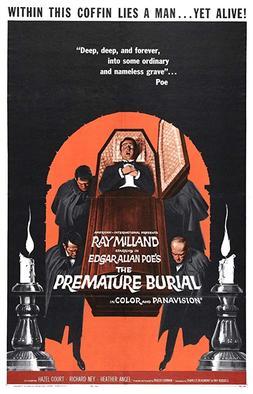The last, for me (but actually the third), Roger Corman Poe Cycle film is The Premature Burial. Released the same year as Tales of Terror, it departs from the other Poe films in not starring Vincent Price. Indeed, this is because it was originally not an American International film, but was later brought into the fold. This particular story by Poe doesn’t have the superstructure of this film at all. Indeed, Poe’s tale is spare, beginning with reported events of premature burial and ending with a first-person fictional account. The movie does have a quote or two from the story, as well as the elaborate preparations that the narrator, in the movie the protagonist Guy Carrell, undertakes to be able to escape his mausoleum. In the movie Carrell has to be an aristocrat, so as to afford such a fancy contrivance.

Although the screenplay was written by Charles Beaumont, a frequent Twilight Zone contributor, it lacks pacing and contains some improbabilities. The theme of grave-robbery is also prominent and doesn’t fit well with what actually happens in the plot. Since the movie is over sixty years old it’s safe to say that it involves a twist ending. The marriage—missing in Poe—of Emily Gault to Guy is a ruse to get the family fortune by murdering Guy by fright. Emily exploits his fears of premature burial (his father suffered catalepsy) to lead to his own premature burial. The grave-robbers, however, visit Guy that night, not realizing that he was only catatonic. Guy then takes his revenge, only to be shot by his sister when he attempts to kill an innocent family friend.
Fitting for the Victorian era, Poe used the theme of premature burial in a number of his stories. “The Premature Burial” is the tale that contains Poe’s famous quote, “The boundaries which divide Life from Death, are at best shadowy and vague.” This remains true even going on two centuries later. Accounts of Near Death Experiences (NDEs) complicate our simple binary of life and death. The movie is, of course, coded as horror and is part of the suggestive string of interpretations that cast Poe as a “horror writer.” Corman had been growing a reputation as a director of horror (but he, like Poe, worked in other genres) and it was this recasting of Poe into what was developing into a mature cinematic genre that partially solidified the writer’s reputation. Premature Burial isn’t the best of the series, but I do feel as though I’ve accomplished something by finally having watched all of them. Or have I?
